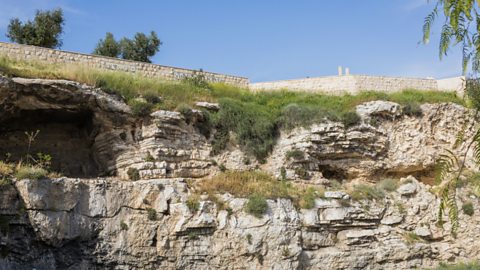JesusвҖҷ final days
Jesus performed one of his last miracles - The raising of LazarusJesus' last miracle, as told in the gospel of John, in which he brings Lazarus of Bethany back from the dead four days after he was buried. - when he was on his way to Jerusalem to celebrate the Jewish festival of Passover. This miracle made him even more popular with the Jewish people, and more and more people were beginning to take seriously the idea that Jesus was the MessiahThe promised deliverer of the Hebrew nation at the end of times.. However, the religious leaders saw Jesus as a threat to their authority, so they planned to kill him.
Last Supper
Following a triumphant entry into Jerusalem with crowds cheering for him, Jesus shared a PassoverJewish festival which remembers the escape of the ancient Israelites from Egypt. meal with his disciples. This is now known as the Last SupperThe meal that Jesus had with his disciples the night before he died where he gave them bread and wine to symbolise his body and blood. and is commemorated by Christians with the EucharistA service celebrating the sacrificial death and resurrection of Jesus Christ, using elements of bread and wine.. At this meal, Jesus gave bread and wine to his disciples. He said:
This is my body. вҖҰ This is my blood.
Do this in remembrance of me.
Bread and wine are used by many Christians when celebrating the Eucharist. Christians of different denominations place a different emphasis on the bread and wine in the Eucharist. There is a wide range of views on this issue. For example, Catholic Christians believe that the miracle of transubstantiation take place during the Eucharist, where the bread and wine are transformed into the body and blood of Jesus. Other Christians, such as Baptists believe that the bread and wine are symbolic JesusвҖҷ body and blood, helping people to remember JesusвҖҷ sacrifice for humanityвҖҷs sins.
Jesus then washed his disciplesвҖҷ feet, teaching them that it is important to serve others. It was also at this time that he predicted someone would betray him. Jesus knew that it would be Judas (one of his disciples), and he told Judas that he must carry out the task:
So Jesus told him, вҖҳWhat you are about to do, do quickly.вҖҷ
Garden of Gethsemane
As well as commemorating the Last Supper whenever they celebrate the Eucharist, Maundy ThursdayThe day before Good Friday, when Jesus had the Last Supper, suffered in Gethsemane and was arrested., is a special day set aside once a year for remembering this important event. After the Last Supper, Jesus and his disciples went to pray in the Garden of Gethsemane. He asked his disciples to keep watch for the soldiers coming but they fell asleep.
Jesus was arrested for blasphemySpeaking about God in a sacrilegious way. as he had been heard calling himself the вҖҳKing of IsraelвҖҷ and the authorities disliked this. Judas identified Jesus to the soldiers by kissing him. Peter tried to defend Jesus and cut off one of the soldier's ears with his sword. Jesus reprimanded Peter and miraculously healed the man's ear.
Trial and crucifixion
Jesus was put on trial by the high priest and found guilty of blasphemy.
He was taken to see Pontius Pilate, the Roman governor, who was responsible for keeping the peace and deciding who could be put to death. Pilate wanted to release Jesus and presented him to the crowd in the hope that they would want him to be freed.
However, they chanted crucify him (Mark 15:13) because they were heavily influenced by the religious leaders and priests who wanted Jesus to be executed. Pilate was therefore pressured into sentencing Jesus to be crucifixionRoman method of execution by nailing someone to a cross, often until they die of asphyxiation; used on Jesus and many others..
Jesus was floggingA punishment that involves a public beating, usually with a flexible stick. and crucified at the site of Golgotha on the day that Christians know as Good FridayFor Christians, the day they remember when Jesus was crucified..

On the cross above his head a sign was attached that mockingly read вҖңKing of the JewsвҖқ.
Jesus suffered on the cross for over six hours and called out My God, my God, why have you forsaken me? (Mark 15:34).
Mark's gospel states that the sky then turned dark, and darkness fell over the land for the last three hours of Jesus' life.
At the moment when Jesus died, the temple curtain ripped in two, which Christians understand to be a sign from God to show that JesusвҖҷ death had atoned for the sins of humanity.
Question
What does the Eucharist commemorate?
The Last Supper